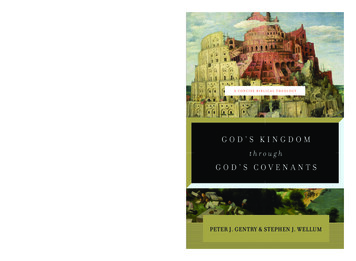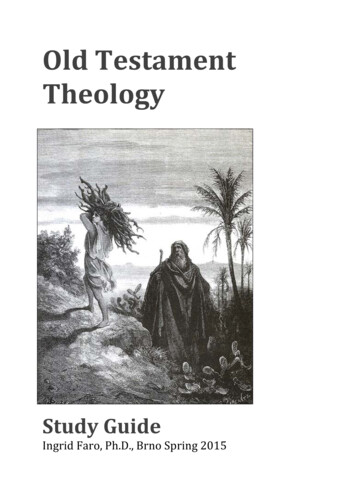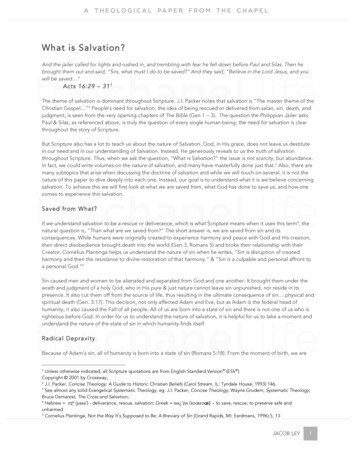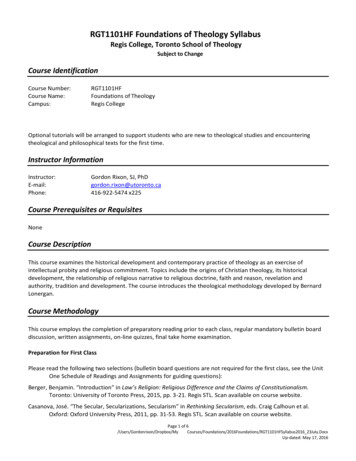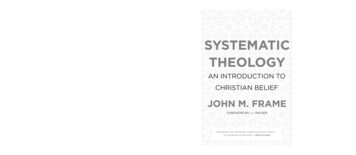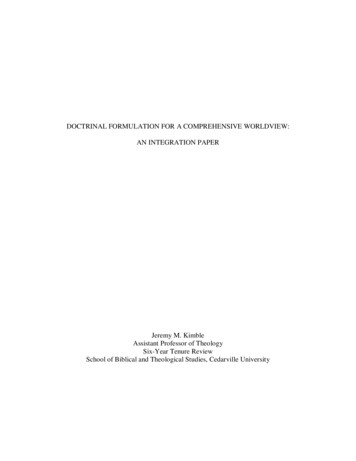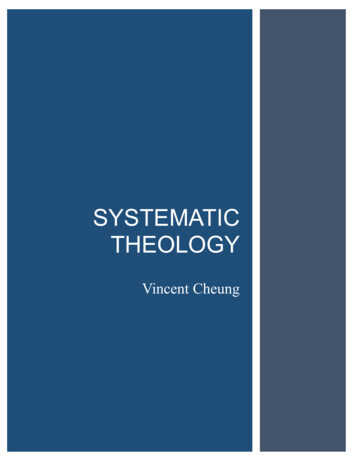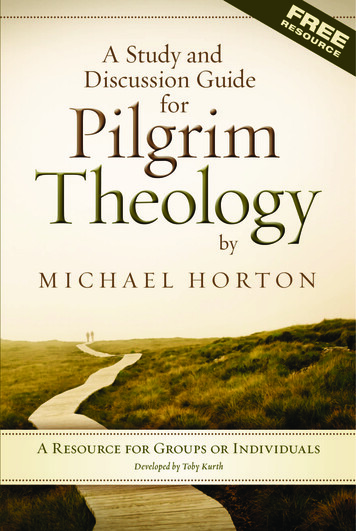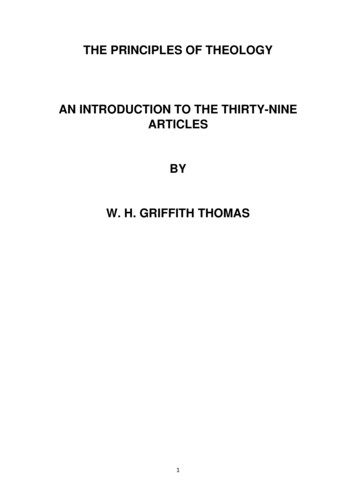
Transcription
THE PRINCIPLES OF THEOLOGYAN INTRODUCTION TO THE THIRTY-NINEARTICLESBYW. H. GRIFFITH THOMAS1
CONTENTSArticleIntroductionI. Of Faith in the Holy TrinityII. Of Christ the Son of GodIII. Of His Going Down into HellIV. Of His ResurrectionArticles 4-10V. Of The Holy SpiritVI. Of the Sufficiency of the ScripturesVII. Of the Old TestamentVIII. Of the Three CreedsIX. Of Original or Birth-SinX. Of Free-WillXI. Of JustificationArticles 11-21XII. Of Good WorksXIII. Of Works before JustificationXIV. Of Works of SupererogationXV. Of Christ Alone without SinXVI. Of Sin after BaptismXVII. Of Predestination and ElectionXVIII. Of Obtaining Salvation by ChristXIX. Of the ChurchXX. Of the Authority of the ChurchXXI. Of the Authority of General CouncilsXXII. Of PurgatoryArticles 22-25XXIII. Of Ministering in the CongregationXXIV. Of Speaking in the CongregationXXV. Of the SacramentsXXVI. Of the Unworthiness of Ministers Articles 26-35XXVII. Of BaptismXXVIII. Of the Lord’s SupperXXIX. Of the Wicked Which Eat Not the Body of ChristXXX. Of Both KindsXXXI. Of Christ’s One OblationXXXII. Of the Marriage of PriestsXXXIII. Of Excommunicate PersonsXXXIV. Of the Traditions of the ChurchXXXV. Of the HomiliesXXXVI. Of Consecrating of Ministers Articles 36-AppendixXXXVII. Of Civil MagistratesXXXVIII. Of Christian Men’s GoodsXXXIX. Of a Christian Man’s Oath2
INTRODUCTIONRevelation[This section is summarised from the writer’s article “Revelation,” in Hastings’ OneVolume Bible Dictionary. The subject is also treated with great fullness and force inthe earlier part of Revelation and Inspiration, by James Orr.]The word “Revelation” almost suggests its own meaning of the unveiling of somethinghidden. It corresponds to the Greek word “Apocalypse” or “Uncovering” (Rev. 1:1). Inthe present connection the word refers to the Revelation of God, the “Unveiling” of theUnseen God to the mind and heart of man. While the term is variously applied, [Thewidest use is found in Gwatkin, The Knowledge of God, Vol. I, p. 5, “Any fact whichgives knowledge is a revelation.the revelation and the knowledge of God arecorrelative terms.”] there are certain specific uses which call for definite consideration.(1) There is the Revelation of God through Nature, referring to the indications ofwisdom, power, and purpose in the world around (Rom. 1:20).(2) There is the Revelation of God in Man, referring to the traces of God’s “image andlikeness” in man’s conscience, emotional nature and personality in general, involvingthe consciousness of obligation, the desire for fellowship, and the craving forsatisfaction.(3) There is the Revelation of God in History, which means the marks of an overrulingProvidence in the affairs of the human race, and the traces of a progress in the historyof nations and mankind in general.(4) There is the Revelation of God in Judaism. The Old Testament involves andrecords a special supernatural communication of God to man, a disclosure of Hischaracter and relationship. (5) There is the Revelation of God in Christianity. This isthe crowning feature of God’s self-manifestation in the Person of Christ for humanredemption.The problem of Revelation is the correlation of the supernatural disclosure of thecharacter, purpose, and grace of God with the historical and fragmentary process bymeans of which this progressive revelation has become a received tradition. [2 Cor.3:14 illustrates both aspects, objective and subjective, of the “unveiling”.] It is essentialthat justice be done both to the supernatural fact and also to the human elements ofthe Revelation. In the course of this we are brought face to face with the antitheses ofRevelation and discovery, of Revelation and speculation, of Revelation and evolution;and while accepting to the full all historical processes we are led to the conviction(1) that Christianity is only adequately explained as a Personal Revelation of God,Who used and guided history for this purpose; and3
(2) that history, discovery, philosophy, and evolution are simply the means or channelsby which the Revelation has come.The possibility of Revelation is based on two grounds:(1) The Being of God as Supreme (which for the moment we assume) must necessarilybe able to reveal Himself. A Personal God necessarily involves the power of a selfrevelation. Theistic belief makes Revelation possible.(2) The nature of man bears the same testimony, for the fact of his personality with allits desires and possibilities involves a capacity for communion with a being higher thanhimself.The probability of Revelation is also based on two grounds:(1) Granted a Supreme Personal Being, we are compelled to predicate His willingnessas well as His ability to reveal Himself. Even human personality with its desire for selfrevelation makes a revelation of God antecedently probable.(2) The needs of man point in the same direction, for as man, and still more as a sinner,he needs a Divine Revelation to guide and guard, to support and strengthen himamidst the problems and dangers of life.The proofs of Divine Revelation are varied, converging, and cumulative.(1) Speculatively, we argue that “the universe points to idealism, and idealism totheism, and theism to a Revelation.” [Illingworth, Reason and Revelation, p. 243.](2) Historically, the Christian religion comes to us commended by the testimony of(a) miracle;(b) prophecy; and(c) spiritual adaptation to human needs.(3) Behind these are the presuppositions of natural religion, as seen in nature, manand history.(4) But ultimately the credibility of Christianity as a Revelation rests on the Person ofits Founder, and all evidences converge towards and centre in Him. The fact that Godhas made other manifestations of Himself in the course of history does not set asidethe culmination of Revelation in the Person of Christ. All truth, however mediated, hascome from the primal source of truth, and the genuineness of Christianity does not setaside the genuineness of other religions as “broken lights.” The real criterion of allreligions claiming to be Divine is their power to save. Not truth in itself, but truth in life,and truth as redemptive, constitutes the final and supreme test of religion.4
The method of the Christian Revelation is first and foremost one of Life; that is, it is arevelation of a Person to persons. Christianity is primarily a religion of facts withdoctrines arising out of the facts. All through the historic period of God’s manifestation,from patriarchal times to the period of Christ and His Apostles, Revelation was givento life and manifested through Personality. But the Divine life has been expressed inWord, first oral and then written. Both in the Old Testament and in the New Testamentwe see first what God was and did to men, and afterwards what He said. So that whilewe distinguish between the Revelation and the Record, the former being necessarilyprior to the latter, yet the Revelation needed the Record for accuracy, and also foraccessibility to subsequent ages. Then, too, Scripture is not merely a record ofRevelation, for the history itself is a Revelation of God. While from one point of viewthe Bible is a product of the Divine process of self-manifestation, on the other the Bibleitself makes God known to man. It is in this sense that Christianity, like Judaism beforeit, is a book religion (though it is also much more), as recording and conveying theDivine manifestation to man. A Revelation must be embodied if it is to be madeavailable for all generations, and the one requirement is that the medium oftransmission shall be accurate. Christ as our Supreme Authority needs for Hismanifestation to all ages the clearest and purest available form.Revelation having been mediated through history has of necessity been progressive.The first stage was primitive Revelation. How men first came to think of God is, andprobably must remain, a matter of conjecture, for as so little is known about primitiveman there must also be little known about primitive religion. One thing, however, isclear, that the terms “savage” and “primitive” are not synonymous, for the savage oftoday represents a degeneration from primitive man. Analogy favours the idea thatprimitive Revelation was a sufficient manifestation of God to enable man to receiveand retain a true relation with his Creator; that man, when created, had an immediatecapacity for entering into fellowship with God, and with this religious endowment weassume a measure of Divine Revelation sufficient to enable man to worship in anelementary way, and to remain true to God. Some such assumption is necessary forthe very conception of Revelation, unless we are to resolve religion into merely humanconjectures about God. There is no argument against primitive Revelation which is notvalid against all Revelation, Christianity included. Then followed in due course theRevelation of God in the Old Testament, and whatever views may be held as to itsorigin and character it is impossible to avoid being conscious of something in it beyondwhat is merely human and historical. It does not merely represent human endeavoursafter worthier ideas of God; it records a true idea of God impressed on the people inthe course of history under definite direction. The Old Testament presentation of Godis so different from that which obtained elsewhere that apart from a supernaturalRevelation it is impossible to account for so marked a difference between peoples whowere in other respects so much alike. The New Testament Revelation was the crownand culmination of the Divine self-manifestation. It was given at a particular time,mediated through one Person, and authenticated by supernatural credentials. In JesusChrist the self-disclosure of God reached its climax, and the New Testament is thepermanent, written embodiment of the uniqueness of Christianity in the world. “God,who in ancient days spoke to our forefathers in many distinct messages and by various5
methods through the prophets, has at the end of these days spoken to us through aSon” (Heb. 1:1, 2; Weymouth).The purpose of Revelation is also life, God’s life, to be received and possessed byman. This practical character is marked everywhere. The “chief end of Revelation” isnot philosophy, or doctrine, or enjoyment, or even morality. Christianity has these, butis far more than them all. It is the religion of Redemption, including Salvation past,present, and future. The “chief end” of God’s self-manifestation is the union of Godand man, and in that union the fulfilment of all the Divine purposes for the world. Manis to receive God’s grace, recognise His will, reproduce His character, render Himservice, and rejoice in His presence here and hereafter.FaithThe subject of Revelation naturally leads on to that of Faith, which is a matter of vitalimportance to Christianity and the Christian. Faith is the human attitude to the DivineRevelation, the attitude of the soul to Christ as the manifestation of God. Christ is theWay, the Truth, and the Life, and Faith is the means of man’s coming to God by Him(Mat. 11:27; John 1:18, 14:6). It is not difficult to understand the interest andimportance of Faith. As it is the foundation principle of earthly life in every aspect ofrelationship, from that of childhood through school days to maturity, in personal, social,commercial, and national affairs, so it enters into religion, and we are thus able to seethe meaning of the words, “Without faith it is impossible to please Him” (Heb. 11:6).Trust is the only adequate answer to God’s Revelation. Just as the absence of faithmakes it impossible for human beings to have any dealings with each other, so theabsence of faith in God makes it wholly impossible for us to have any association withHim. “He that cometh to God must believe” (Heb. 11:6). Trust is thus the correlative oftruth. Faith in man answers to grace in God. As such, it affects the whole of man’snature. It commences with the conviction of the mind based on adequate evidence; itcontinues in the confidence of the heart or emotions based on the above conviction,and it is crowned in the consent of the will, by means of which the conviction andconfidence are expressed in conduct. This is perhaps the meaning of the words, “Faithis the substance of things hoped for, the evidence of things not seen” (Heb. 11:1). Thepassage is not so much a definition of faith as a description of it in relation to life, andas such it is illustrated by the examples of faith throughout that chapter. Thus faith isthe outgoing of the whole nature to what it believes to be true, or rather, to Him Whois held to be the Truth. It is this that Richard Hooker meant when he spoke of faith asincluding(1) the certainty of evidence, and(2) the certainty of adherence. Faith is not blind, but intelligent, since it rests on theconviction of the authority of Christ as Teacher, Saviour, and Lord. The threefoldRevelation of Christ as Prophet, Priest, and King, revealing, redeeming, and ruling, ismet by the response of the whole life, intellect, emotion, and will. This combination of6
all the elements in human nature involves a moral decision which is illustrated inalmost every part of the New Testament (Acts 2:41, 17:11; 1 Thess. 1:5; Jas. 1:21).But it is necessary to note that the word Faith is also used for the substance of doctrineas well as for the attitude of the soul, for fides quae creditur as well as fides quacreditur. This is sometimes spoken of as “the Faith”, meaning the Christian truth whichis everywhere believed among Christians. It is seen in such expressions as “the faithwhich was once for all delivered unto the saints” (Jude verse 3, R.V.); “the commonfaith” (Tit. 1:4); “the faith of the Gospel” (Phil. 1:27). This twofold use of the term “Faith”necessitates the greatest possible care in distinguishing between believing truths andtrusting a Person. The Church Catechism first of all refers to believing “all the articlesof the Christian Faith”; that is, the various parts or points of the Christian religion. Butthis is only a means to an end, since the supreme object of Christian faith can be noneother than God Himself. Consequently, the Catechism appropriately follows therehearsal of the Creed by the Question and Answer, “What dost thou chiefly learn bythese articles of thy belief?” “I learn to believe in God.” It is only too possible to believewith an intellectual conviction the facts and truths of Christianity, and yet to fall shortof full trust in God. When we read that the devils believe and tremble (Jas. 2:19), wesee the difference between intellectual conviction and personal trust. These twoelements of faith are found from time to time in Holy Scripture. Thus our Lord speaksin one passage, first, of “hearing His Word”; that is, receiving and acceptingintellectually what He said; and, then, of believing on God Who sent Him; that is,personal trust in God arising out of the acceptance of Christ’s Word (John 5:24).Nothing short of the latter can satisfy the requirements of the Christian religion. [BishopPearson (Creed, Article I) quoting Durandus, says: “ credere in Deum’ non estpraecis actus fidei, sed fidei et caritatis simul.”] All facts and truths are intended as thefood, warrant, and inspiration of full trust, and are intended only to lead to this outgoingof the whole soul in personal confidence in and dependence on God. Danger lies inthe frequent implication that man only needs instruction, while overlooking the solemntruth that by reason of sin he needs illumination as well. So that while the intellect isnot to be neglected, faith is very much more than knowledge. It is not mere belief in athought, or conception, or idea. It is the expression of the whole nature of man inresponse to God’s approach in Christ. As such, it involves personal committal andconfidence. Conviction alone stops short with orthodoxy, and is liable to lead toformalism, but to be orthodox is not to be saved. Faith is the surrender of the soul toGod and the appropriation of the grace which saves. Correct views of Christ areessential and vital. It behoves us to be thoroughly acquainted with the facts and truthsof the Christian religion related to the Person of Christ, His Resurrection, the HolySpirit, the Bible, and all else. But it must not be assumed that all is settled when thefacts of the Christian religion are guaranteed and understood. We may inspect therecords and make sure of the history and all the while may only obtain informationabout God without a personal experience of Him in the soul. Intellectual beliefs arevaluable is means to ends, but not as ends themselves. In all true faith, therefore,there will of necessity be the three elements of knowledge, assent, and confidence,and anything short of these will never give the full Christian trust. The knowledge ofGod consists in sympathetic understanding of His character. We only know our friends7
so far as mutual sympathy gives us insight into their real nature. There are certaindistinctions in the original languages of the Creeds, the Latin of the Apostles’ Creedand the Greek of the Nicene Creed, which help to make this clear. In Latin, CredoDeum (esse) means, “I believe God exists”; Credo Deo, “I believe what God says”;Credo in Deum, “I trust God.”[“In every movement of faith, therefore, from the lowest to the highest, there isan intellectual, an emotional, and a voluntary element, though naturally theseelements vary in their relative prominence in the several movements of faith. Thisis only as much as to say that it is the man who believes, who is the subject offaith, and the man in the entirety of his being as man” (Warfield, PrincetonTheological Review, Vol. IX, p. 566)]When once we have learned that God is the True Object of faith and we have beenmade acquainted with the substance of Christian truth, we naturally enquire whatprecisely we are to believe about God as essential, as distinct from that which is purelyaccidental. Our enquiry is met by being directed to Holy Scripture. This is the guideand standard of our faith, and the, supreme authority as to what we are to believe. Weshall see in Article VI that this is the fundamental principle of the Church of England.“Holy Scripture containeth all things necessary to salvation; so that whatsoever is notread therein, nor may be proved thereby, is not to be required of any man, that it shouldbe believed as an article of the Faith, or be thought requisite or necessary to salvation.”God has given His people a written Revelation of Himself, and this tells us clearly allthat it is necessary for us to know about God. The more we ponder this Revelation themore we shall learn to know and trust God Who is revealed here. “Faith cometh byhearing, and hearing by the Word of God” (Rom. 10:17). The Bible is therefore of firstimportance for Christian knowledge and life. In theological language it is “the Rule ofFaith,” affording us information about truth and preserving us against error. TheCreeds which we accept and hold are summaries of what the Bible contains, and aresubordinate to the Bible as a secondary Rule of Faith.DoctrineThe New Testament has two words for doctrine, διδαχή, and διδασκαλία (2 Tim. 4:2,3; Tit. 1:9). Both together they occur about fifty times. The word “doctrine” itself iscolourless, and is therefore used for truth and error: (a) doctrine of God (Tit. 2:10); ofChrist (2 John verse 9); “sound” (1 Tim. 1:10); “good” (1 Tim. 4:6). (b) Of men (Col.2:22); of demons (1 Tim. 4:1); every wind (Eph. 4:14); divers and strange (Heb. 13:9).This necessitates the use of the term “Christian” doctrine to express the truths of DivineRevelation, and perhaps we may define Christian doctrine as the fundamental truthsof revelation arranged in systematic form. Dogma, like other Greek words in μα, standsfor something fixed, completed, quod statutum est.8
[“A dogma is not a δόγμα, not a subjective, human opinion, not an indefinite,vague notion; nor is it a mere truth of reason, whose universal validity can bemade clear with mathematical or logical certainty: it is a truth of faith, derivedfrom the authority of the word and revelation of God;— a positive truth, therefore,positive not merely by virtue of the positiveness with which it is laid down, butalso by virtue of the authority with which it is sealed” (Martensen, ChristianDogmatics, p. 1)]TheologyThe term “theology” is used for the scientific expression of all truths relating to divinerevelation. Just as nature has to be distinguished from science, so has revelation fromtheology. Science is the technical expression of the laws of nature; theology is thetechnical expression of the revelation of God. It is the province of theology to examineall the spiritual facts of revelation, to estimate their value, and to arrange them into abody of teaching. Doctrine thus corresponds with the generalizations of science.Theology, as the science of religion is concerned with all the phenomena of revelationrecorded in Holy Scripture.Special attention has been given of recent years to what is now known as BiblicalTheology, which means theology drawn direct from the Bible and formulated along thelines in which it is there presented. It possesses at once variety and unity; variety,because it was not given all at once, but at stages; unity, because the Bible is held tocontain a complete view of theological thought. It is the work of Biblical Theology toset forth this variety and unity of truth.Dogmatic Theology is the systematised statement of truth deduced from the Bible, theintellectual expression in technical language of what is contained in the Word of God.Martensen defines dogmatics as “the science which presents and proves the Christiandoctrines regarded as forming a connected system.” [Christian Dogmatics, p. 1.]Dogmatic Theology is not necessarily non-Biblical, and Biblical Theology itselfdepends on the standpoint of the writer.[“Biblical or New Testament theology deals with the thoughts, or the mode ofthinking, of the various New Testament writers; systematic theology is theindependent construction of Christianity as a whole in the mind of a later thinker.Here again there is a broad and valid distinction, but not an absolute one. It isthe Christian thinking of the first century in the one case, and of the twentieth, letus say, in the other; but in both cases there is Christianity and there is thinking,and if there is truth in either, there is bound to be a place at which the distinctiondisappears” (Denney, The Death of Christ, p. 5)]There is obvious danger in every attempt at systematizing Christian truth, as we maysee from the great works of men like Thomas Aquinas and John Calvin. The humanmind is unable to find a place for every single Christian doctrine, and it is far better tobe content with “Articles,” or “points,” with gaps unfilled, because it is impossible for9
thought to be covered by them. General lines of Christian truth are far safer and alsotruer to the growth of thought and experience through the ages. This method preventsteaching becoming hardened into a cast-iron system which cannot expand. It is thevirtue of the Church of England Articles that they take this line and do not commitChurchmen to an absolute, rigid system of doctrine from which there is no relief andof which there is no modification.Creeds, Confessions, and ArticlesFaith is response to divine revelation, and confession is the expression of faith.“What song is to the victory it celebrates, confession is to the religious spirit. .Religion, like Science, not only seeks and finds the hid treasures of truth, but isfain to cry ‘Eureka.’.Religion only betrays an instinct which is universalthroughout all the higher interests and activities of humanity when it thus givesutterance, in language as august as lips can frame, to its mature convictions.”[W. A. Curtis, History of Creeds and Confessions of Faith, p. 2.]Every religion has a Creed in one form or another, and we are therefore not surprisedto find that the confession of the Christian faith has taken various shapes through theages. The Creed, properly so-called, is a short, comprehensive statement of beliefsuitable for discipleship and worship. The earliest form of this was personal,expressive of personal confidence in Christ; it was the natural outcome of thepossession of spiritual life. But even here the intellect was necessarily involved, for tobelieve in Christ was to take up some intellectual attitude in relation to Him. Very soona more elaborate confession of faith was felt to be necessary, and in due courseenquiry and examination at Baptism led to further tests and requirements. Later on thepressure of various heresies accentuated the need of a careful statement of theChristian position.The making of Creeds may be said to have covered the first four centuries of theChristian era, and then nothing of importance in this respect happened until the dawnof new light and life in the sixteenth century, when confessions of faith and fullstatements of specific belief arose in connection with the Reformation movement.There had been debates and discussions in the Middle Ages, but they were nottheological and Christological. There seems to have been no desire to reopenproblems settled ages before by the great Councils, but there was much thought andno little discussion on such matters as the Church, Ministry, Sacraments, and personalreligion. When, however, the various Reformed Churches broke loose from Rome itwas found essential to state their position with reference to the specific reasons forprotest. As a result we find entire agreement on fundamental facts with very differentexpressions of the specific applications of those facts.Creeds and Confessions are sometimes contrasted to the detriment of the latter, buta study of the historical order of emergence of these documents of the faith suggestsa comparison rather than a contrast. As we follow in order the three Creeds10
themselves, the Apostles’, the Nicene, and the Athanasian, we find that there is atendency to elaboration, to a fuller theological statement, and to an explanation of whatis involved in the original summary of belief. The confessions of faith in the sixteenthcentury are really only an extension, prolongation, and development of the sameprocess.If it be said that these Articles and other documents of the sixteenth century areincomplete, and do not provide an adequate statement of belief, it may be pointed outthat the same is true of the Creeds. There are many subjects unnoticed in theecumenical documents of our faith, and we believe this is one of the instances in whichthe Church has been definitely guided by God. The Church Universal is onlycommitted to a comparatively few fundamental realities, and we might as wellcomplain of the incompleteness of any of the three Creeds as criticise theincompleteness of any of the sixteenth-century Confessions of Faith. They must bejudged in the light of the circumstances which gave them birth, and with strict andconstant regard to their specific purpose.The Anglican ArticlesThe Thirty-nine Articles have a threefold value and importance:–(a) Historical: in relation to their origin. They are part of the Reformation position andprotest. Definition was necessary on the part of all who differed from Rome, and as aresult all the Reformed Churches drew up their protest in the form of Confessions, orArticles. Our Articles are thus not only analogous to documents of ContinentalChurches, but were also influenced by them. They cannot be separated from theirhistorical root in relation to Rome. They mark the position of the Church of England asit was restated in the sixteenth century, and they are equally important now for thesame reason. They still mark our present position and attitude.Another aspect of the connection of the Articles with Rome lies in the fact that theywere written by men who had been taught and trained in the system of Romantheology, and a knowledge of the Roman Catholic controversy is therefore essentialto a full understanding of the Articles. But in addition to the necessity of declaring theirattitude against Rome, the Reformers were compelled to take action against dangersfrom the opposite direction. The inevitable swing of the intellectual and moralpendulums had produced serious errors of many kinds, and these were being chargedby Rome on all Reformers and attributed to the Reformation movement in general. Itwas therefore essential not only to define what the true Reformation position was, butalso to do everything possible to safeguard its members from reactionary or othererrors which had become rife in different localities.(b) Doctrinal: in relation to Church doctrine. They are of supreme value as giving thestandard of Church of England doctrine on(1) points identical with the doctrines of other Churches, and on11
(2) points characteristic of our own position. They give with exactness, balance, andfullness the supreme voice of our Church on all matters covered therein.(c) Practical: in relation to the Christian life. The Articles express the intellectualposition involved in being a believer, the explicit, intellectual sign of what is spirituallyimplicit from the first moment of faith in Christ. When He is accepted as Saviour, Lord,and God, everything else is involved and possessed in germ. We commence by faithand go on to knowledge. It is inevitable that we should think out our position. Petertells us to be ready to give a reason for the hope that is in us (1 Pet. 3:15), and we seethe natural order of experience followed by expression.(1) Hope possessed;(2) having a reason for our hope;(3) giving a reason.The intellectual grasp of Christianity is essential for a strong Christian life, for givingbalance and force to experience, for protection against error, for equipment for service.It is possible to be thought spiritual and yet to be only emotional
THE PRINCIPLES OF THEOLOGY AN INTRODUCTION TO THE THIRTY-NINE ARTICLES BY W. H. GRIFFITH THOMAS . 2 CONTENTS Article Introduction I. Of Faith in the Holy Trinity II. Of Christ the Son of God III. Of His Going Down into Hell IV. Of His Resurrection Articles 4-10 V. Of The

